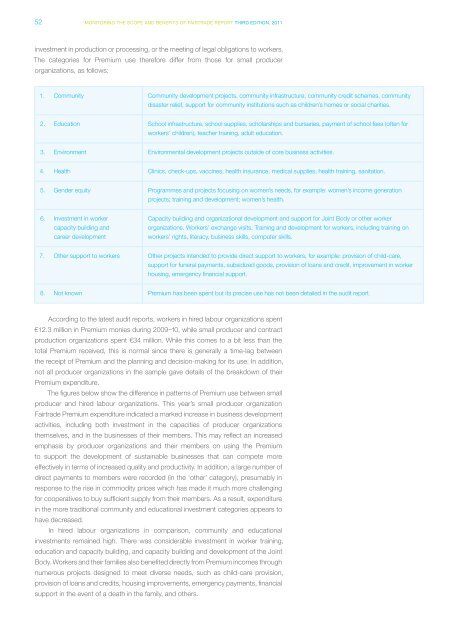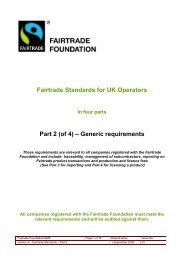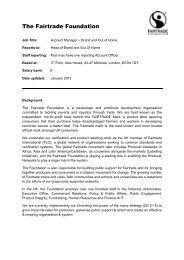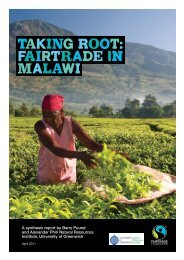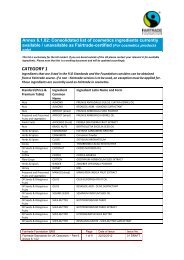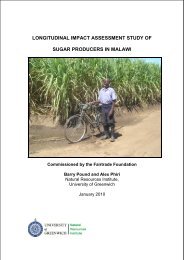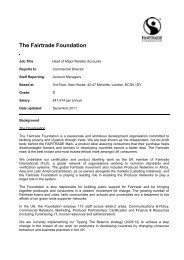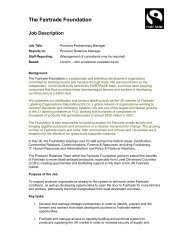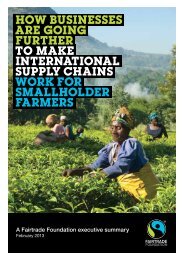Monitoring the scope and benefits of fairtrade
Monitoring the scope and benefits of fairtrade
Monitoring the scope and benefits of fairtrade
You also want an ePaper? Increase the reach of your titles
YUMPU automatically turns print PDFs into web optimized ePapers that Google loves.
52 <strong>Monitoring</strong> <strong>the</strong> <strong>scope</strong> <strong>and</strong> <strong>benefits</strong> <strong>of</strong> <strong>fairtrade</strong> report third edition, 2011<br />
investment in production or processing, or <strong>the</strong> meeting <strong>of</strong> legal obligations to workers.<br />
The categories for Premium use <strong>the</strong>refore differ from those for small producer<br />
organizations, as follows:<br />
1. Community Community development projects, community infrastructure, community credit schemes, community<br />
disaster relief, support for community institutions such as children’s homes or social charities.<br />
2. Education School infrastructure, school supplies, scholarships <strong>and</strong> bursaries, payment <strong>of</strong> school fees (<strong>of</strong>ten for<br />
workers’ children), teacher training, adult education.<br />
3. Environment Environmental development projects outside <strong>of</strong> core business activities.<br />
4. Health Clinics, check-ups, vaccines, health insurance, medical supplies, health training, sanitation.<br />
5. Gender equity Programmes <strong>and</strong> projects focusing on women’s needs, for example: women’s income generation<br />
6. Investment in worker<br />
capacity building <strong>and</strong><br />
career development<br />
projects; training <strong>and</strong> development; women’s health.<br />
Capacity building <strong>and</strong> organizational development <strong>and</strong> support for Joint Body or o<strong>the</strong>r worker<br />
organizations. Workers’ exchange visits. Training <strong>and</strong> development for workers, including training on<br />
workers’ rights, literacy, business skills, computer skills.<br />
7. O<strong>the</strong>r support to workers O<strong>the</strong>r projects intended to provide direct support to workers, for example: provision <strong>of</strong> child-care,<br />
support for funeral payments, subsidized goods, provision <strong>of</strong> loans <strong>and</strong> credit, improvement in worker<br />
housing, emergency financial support.<br />
8. Not known Premium has been spent but its precise use has not been detailed in <strong>the</strong> audit report.<br />
According to <strong>the</strong> latest audit reports, workers in hired labour organizations spent<br />
€12.3 million in Premium monies during 2009–10, while small producer <strong>and</strong> contract<br />
production organizations spent €34 million. While this comes to a bit less than <strong>the</strong><br />
total Premium received, this is normal since <strong>the</strong>re is generally a time-lag between<br />
<strong>the</strong> receipt <strong>of</strong> Premium <strong>and</strong> <strong>the</strong> planning <strong>and</strong> decision-making for its use. In addition,<br />
not all producer organizations in <strong>the</strong> sample gave details <strong>of</strong> <strong>the</strong> breakdown <strong>of</strong> <strong>the</strong>ir<br />
Premium expenditure.<br />
The figures below show <strong>the</strong> difference in patterns <strong>of</strong> Premium use between small<br />
producer <strong>and</strong> hired labour organizations. This year’s small producer organization<br />
Fairtrade Premium expenditure indicated a marked increase in business development<br />
activities, including both investment in <strong>the</strong> capacities <strong>of</strong> producer organizations<br />
<strong>the</strong>mselves, <strong>and</strong> in <strong>the</strong> businesses <strong>of</strong> <strong>the</strong>ir members. This may reflect an increased<br />
emphasis by producer organizations <strong>and</strong> <strong>the</strong>ir members on using <strong>the</strong> Premium<br />
to support <strong>the</strong> development <strong>of</strong> sustainable businesses that can compete more<br />
effectively in terms <strong>of</strong> increased quality <strong>and</strong> productivity. In addition, a large number <strong>of</strong><br />
direct payments to members were recorded (in <strong>the</strong> ‘o<strong>the</strong>r’ category), presumably in<br />
response to <strong>the</strong> rise in commodity prices which has made it much more challenging<br />
for cooperatives to buy sufficient supply from <strong>the</strong>ir members. As a result, expenditure<br />
in <strong>the</strong> more traditional community <strong>and</strong> educational investment categories appears to<br />
have decreased.<br />
In hired labour organizations in comparison, community <strong>and</strong> educational<br />
investments remained high. There was considerable investment in worker training,<br />
education <strong>and</strong> capacity building, <strong>and</strong> capacity building <strong>and</strong> development <strong>of</strong> <strong>the</strong> Joint<br />
Body. Workers <strong>and</strong> <strong>the</strong>ir families also benefited directly from Premium incomes through<br />
numerous projects designed to meet diverse needs, such as child-care provision,<br />
provision <strong>of</strong> loans <strong>and</strong> credits, housing improvements, emergency payments, financial<br />
support in <strong>the</strong> event <strong>of</strong> a death in <strong>the</strong> family, <strong>and</strong> o<strong>the</strong>rs.


